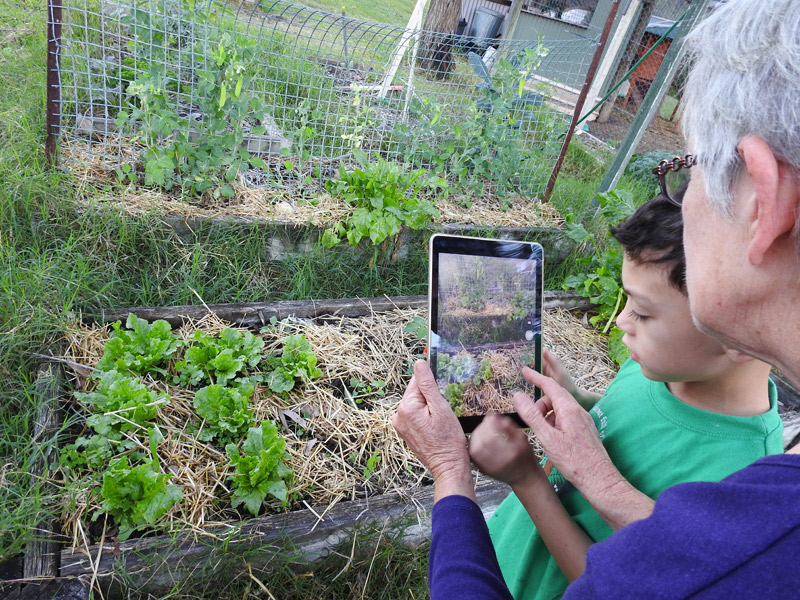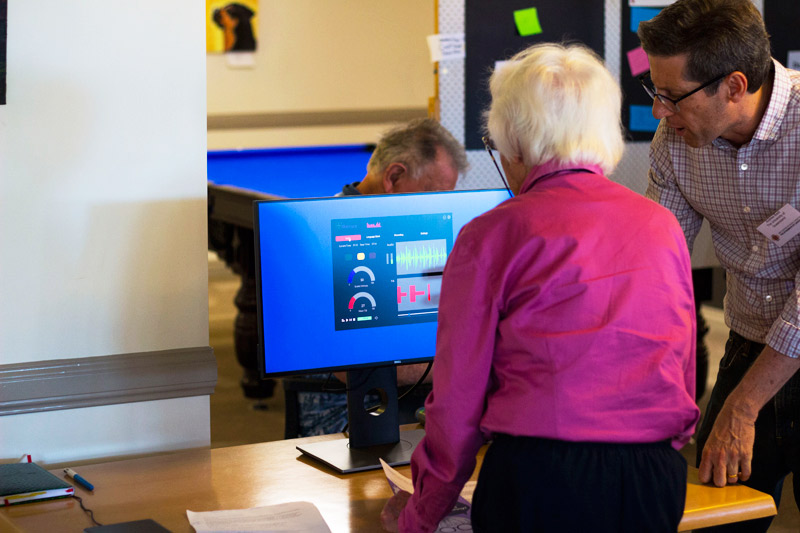
The Florence project designs communication technology to assist people living with dementia.
The technology provides:
- Banks of meaningful personal knowledge;
- Metrics to detect communication difficulty;
- And prompts to support life tasks.
We co-design with people who live with or support those living with dementia.Our team includes computer science, interaction design, speech pathology, psychology, cognitive science and occupational therapy.
![]() Project Florence is a community-based project lead by the UQ node of the ARC Centre of Excellence for The Dynamics of Language.
Project Florence is a community-based project lead by the UQ node of the ARC Centre of Excellence for The Dynamics of Language.
Support the Florence Project
Your gift supports the Florence co-design team in developing pioneering technologies that help people living with dementia stay connected, confident, and independent in everyday life.
Want to know more?
Florence Project: Make my day go better
Florence Project: How dementia changes communication: An introduction
Florence Project: How to communicate well with people living with dementia
Florence Project: How can technology help people living with dementia? An Introduction
Florence Project: Janet Wiles - presented in the panel session on Human-centred social robots at the United Nations AI4Good Global Summit, Geneva 31st May, 2024
Florence Project: Making the day go better.
Peter Worthy - presented Lessons from the co-design of a communication technology with a lived experience reference group at the ARC Centre of Excellence Canberra, 29th Sep 2022
Want to get involved?

Are you living with dementia? Are you caring for someone with dementia?
Visit the Florence Community page for opportunities to get involved in the study and project updates.
Florence in the news
- Older Australians shape how new technologies are developed
- Research Blog: Challenges of communicating as part of living with dementia
- Advancing human-centered social robots for good (panel session at the United Nations AI For Good Global Summit, Geneva 2024)
- Developing transport technology with people living with dementia
- Building dementia tech together
- Can AI make life easier for people with dementia?
Presentations
Key publications
Nickbakht, Mansoureh, Anthony J. Angwin, Bonnie BY Cheng, Jacki Liddle, Peter Worthy, Janet H. Wiles, Daniel Angus, and Sarah J. Wallace. "Putting "the broken bits together": A qualitative exploration of the impact of communication changes in dementia." Journal of Communication Disorders 101 (2023): 106294. https://doi.org/10.1016/j.jcomdis.2022.106294 View abstract
Back, Andrew D., and Janet Wiles. "Estimation of Statistical Manifold Properties of Natural Sequences using Information Topology." In 2023 IEEE Statistical Signal Processing Workshop (SSP), pp. 542-546. IEEE, 2023. DOI: 10.1109/SSP53291.2023.10207948<https://doi.org/10.1109/SSP53291.2023.10207948> View article
Liddle, J., Worthy, P., Frost, D., Taylor, E., & Taylor, D. (2022). Partnering with people living with dementia and care partners in technology research and design: Reflections and recommendations. Australian Occupational Therapy Journal, 69(6), 723–741. https://doi.org/10.1111/1440-1630.12843 View article: https://pubmed.ncbi.nlm.nih.gov/36203322/
Liddle J, Worthy P, Frost D, et al. (2022) Personal and complex: The needs and experiences related to technology use for people living with dementia. Dementia. 21(5):1511-1531. DOI: 10.1177/14713012221084521
View article: https://pubmed.ncbi.nlm.nih.gov/35420505/
Back, Andrew D., and Janet Wiles. "Estimating sentence-like structure in synthetic languages using information topology." Entropy 24, no. 7 (2022): 859. https://doi.org/10.3390/e24070859 View article
Back, Andrew D., and Janet Wiles. "An information theoretic approach to symbolic learning in synthetic languages." Entropy 24, no. 2 (2022): 259. https://doi.org/10.3390/e24020259 View article
Liddle, Jacki, Avelie Stuart, Peter Worthy, Mark Levine, Tim Kastelle, Janet Wiles, Nancy A. Pachana, and Linda Clare. (2021) "Building the threads of connection that we already have": The nature of connections via technology for older people." Clinical Gerontologist 44, no. 4: 406-417. https://doi.org/10.1080/07317115.2020.1852638 View article
Back, Andrew D., and Janet Wiles (2021) "Entropy Estimation Using a Linguistic Zipf-Mandelbrot-Li Model for Natural Sequences." Entropy 23, no. 9 (2021): 1100. https://doi.org/10.3390/e23091100 View article
R. A. Sluis et al., “An Automated Approach to Examining Pausing in the Speech of People With Dementia,” American Journal of Alzheimer’s Disease & Other Dementias, vol. 35, p. 1533317520939773, 2020, doi: 10.1177/1533317520939773. Read Full Article
A. D. Back, D. Angus, and J. Wiles, “Transitive Entropy—A Rank Ordered Approach for Natural Sequences,” IEEE Journal of Selected Topics in Signal Processing, vol. 14, no. 2, pp. 312–321, Feb. 2020, doi: 10.1109/JSTSP.2019.2939998. Read Abstract
A. D. Back, D. Angus, and J. Wiles, “Determining the Number of Samples Required to Estimate Entropy in Natural Sequences,” IEEE Transactions on Information Theory, vol. 65, no. 7, pp. 4345–4352, Jul. 2019, doi: 10.1109/TIT.2019.2898412. Read Abstract
B.-M. Whelan et al., “Toward the Development of SMART Communication Technology: Automating the Analysis of Communicative Trouble and Repair in Dementia,” Innovation in Aging, vol. 2, no. igy034, Sep. 2018, doi: 10.1093/geroni/igy034. Read Full Article
D. Angus, Y. Yu, P. Vrbik, A. Back, and J. Wiles, “PauseCode: Computational Conversation Timing Analysis,” in Proceedings of the 4th International Workshop on Multimodal Analyses Enabling Artificial Agents in Human-Machine Interaction, New York, NY, USA, Oct. 2018, pp. 43–47, doi: 10.1145/3279972.3279975. Read Abstract
A. D. Back, D. Angus, and J. Wiles, “Fast Entropy Estimation for Natural Sequences,” arXiv:1805.06630 [physics], May 2018, Accessed: Feb. 19, 2021. [Online]. Available: Read Full Article
H. J. Chenery, C. Atay, A. Campbell, E. Conway, D. Angus, and J. Wiles, “Using Technology to Enhance Communication Between People with Dementia and their Carers,” Alzheimer’s & Dementia, vol. 12, no. 7S_Part_5, pp. P279–P280, 2016, doi: Read Full Article
C. Atay, E. R. Conway, D. Angus, J. Wiles, R. Baker, and H. J. Chenery, “An Automated Approach to Examining Conversational Dynamics between People with Dementia and Their Carers,” PLOS ONE, vol. 10, no. 12, p. e0144327, Dec. 2015, doi: 10.1371/journal.pone.0144327. Read Full Article
C. Atay (née Knuepffer) et al., Using Discursis for the computer-¬assisted analysis of conceptual recurrence in conversations in Parkinson’s disease. 2015. View PDF

Project members
For more information about our project and opportunities to collaborate, please get in touch:
- Chief investigator, Associate Professor Anthony Angwin (Speech Pathology)
- Project manager and researcher, Dr Peter Worthy (Interaction Design)
- Chief Investigator, Technology Thread Leader CoEDL, Professor Janet Wiles (Human-Centred Computing)
- Researcher, Dr Jacki Liddle (Occupational Therapy)
- Researcher, Professor Dan Angus (Computer Science)
- Research assistant, Amanda Gellatly (Speech Pathology)
- Research assistant, Ryan Deslandes (Software Engineering)
- Lived Experience Experts


